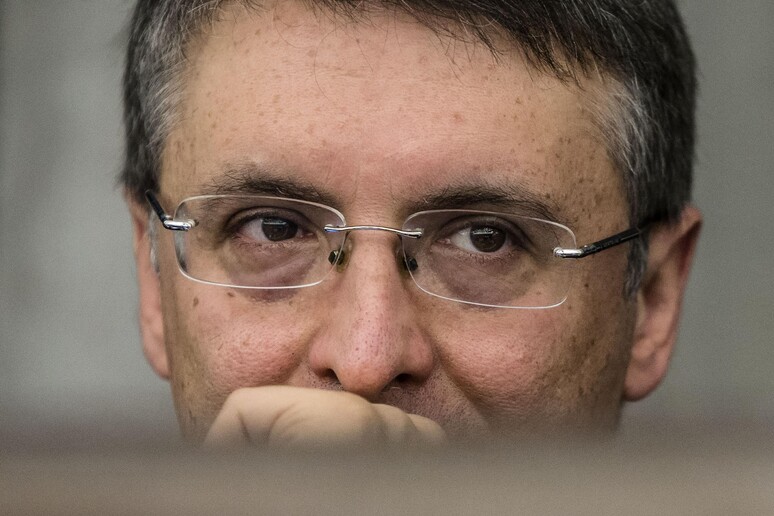Italy's anti-corruption czar,
Raffaele Cantone, on Tuesday called for a wider use of special
anti-graft vetting powers used ahead of this year's Expo world's
fair in Milan in order to stem a seemingly endless flow of
sleaze.
Italy should extend the special anti-corruption controls it
has set up for Expo all major public-works projects, Cantone
told a conference with the OECD on the world fair procedures in
Rome.
"We should extend the experience of the exceptional
controls implemented on the Expo contracts to major public
works," he said.
Cantone, the head of Italy's anti-corruption authority, had
a hand in fine-tuning the Expo contract-vetting and anti-graft
procedures that helped uncover a major scandal last year.
In a TV interview at the weekend he said other countries
had been asking if they could copy them.
"The OECD," he told Tuesday's conference, "will tell us
whether our controls have worked and whether what we have
deployed for the Expo can become a virtuous instrument which
Italy needs, a country that lives and dies on corruption".
Cantone went on to say that the government's
anti-corruption bill, now nearing approval after being bogged
down for two years, is "very useful but does not have miraculous
effects".
It would be a "mistake," he said, to give the impression
that "the bill can wipe out corruption".
"The bill is very important but a well-designed code of
contract bidding is a lot more use to stem corruption than
raising penalties".
Cantone insisted that the bill which will hit the
Senate floor Wednesday is not a panacea because the fight
against the corruption epidemic is not waged by "repressive
measures alone".
As for the bidding code, Cantone added, the framework of
new rules is being put into another government bill.
"The underlying idea," he said, "is to cancel structures
run by commissioners and ad hoc procedures".
"That book has to be closed, and another one opened".
Cantone and Economy Minister Pier Carlo Padoan recently
unveiled what they called a decalogue of 10 rules to try to
address a seemingly endless stream of corruption scandals.
The 12-page directive aims to prevent graft and kickbacks
in public contracts and State-owned firms.
It calls for the corporate life and operating decisions of
State companies to be made public, the rotation of managers and
executives, stringent conflict-of-interest rules, a map of
at-risk areas, and protection for whistle-blowers.
The new rules will be applied immediately to unlisted firms
that are directly controlled by the economy ministry, and will
be extended to listed ones after consultation with Consob stock
market watchdog agency.
They will affect companies that are strategic to the
Italian economy, such as ANAS roads and highways operator, ENEL
power utility, ENI oil and gas giant, Expo world's fair manager,
Finmeccanica aerospace and defence giant, the Italian Investment
Fund, Ferrovie dello Stato national railway company, Poste
Italiane post office, RAI public broadcaster, and SOGEI
information and communications technology company.
The 'decalogue' is meant to become a blueprint for regional
and municipal public companies as well.
Italy has seen a series of graft probes involving all major
parties in recent years, prompting Cantone to say the fight
against corruption was "just as vital" for the nation's future
as the one against the mafia.
Graft probes, often involving illegal party funding and bid
rigging, have touched all political sides, while kickbacks
investigations have reached to major prestige projects like this
year's Expo world's fair and Venice's MOSE flood barriers.
Leftwing cooperatives have been involved in some of the
cases, including embezzlement at Italy's oldest bank Monte dei
Pachi di Siena and a probe that unearthed a mafia-like crime
organisation in Rome that claimed to be making more money out of
Roma and migrant facilities than it could have out of drugs.
More recently a huge public-works graft scandal, where
costs were inflated by 40%, led to the resignation of
Infrastructure Minister Maurizio Lupi, even though he was not
under investigation.
In the most recent case, a major probe into alleged bribes
paid to obtain public contracts on the Bay of Naples island of
Ischia, 10 people were arrested on Monday including the island's
mayor, Giuseppe 'Giosi' Ferrandino.
Cantone on Tuesday requested that prosecutors send him the
case files.
"We have officially requested the documents from the
Naples prosecutor's office to see whether there are contracts
that can be put into the hands of administrators," he said.
"We'll check. First we must read the files".
The probe involves one of the biggest of Italy's leftwing
cooperative companies, Gruppo CPL Concordia.
Ferrandino, mayor for seven years, is a member of Premier
Matteo Renzi's centre-left Democratic Party (PD).
Ferrandino's brother Massimo Ferrandino was also arrested
along with several officials from CPL Concordia, a huge former
Communist cooperative founded in Modena in 1899 and employing
some 1,800 people, with 70 branches worldwide.
Investigation documents allege that CPL Concordia signed
two sham conventions worth 330,000 euros with the Ferrandino
family hotel, hired Massimo Ferrandino as a consultant and paid
for at least one holiday in Tunisia in exchange for the alleged
favours.
The investigators believe CPL Concordia executives also
paid money to members of the Campania mafia, the Camorra, as
part of the scam.
Corruption is said to cost Italy some 60 billion euros a
year and Italy lags its European and OECD partners in
international corruption perception polls.
ALL RIGHTS RESERVED © Copyright ANSA











